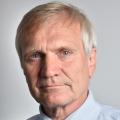
A YORK Museums Trust manager has recalled the day Professor Stephen Hawking - who has died aged 76 - paid a surprise visit to the Yorkshire Museum.
The world's most famous physicist visited York in 2014 to relive treasured memories of a family trip years before, and he was seen in city bars and museums, drawing attention wherever he went.
Lee Clark, communications and evaluation manager at the museums trust, said he came on a personal visit to the Yorkshire Museum and staff had not know in advance.
"He spent a while exploring all the galleries and the guides at the museum say members of the public were courteous and allowed him to enjoy his free time," he said.
"On leaving, we asked if it would be possible to take a photograph of him and he was happy to oblige.
"I was lucky enough to be the person taking the photograph and I had a brief conversation with him to say thank you for visiting.
"I can say it is the only time I have been truly star struck and it was an honour to meet such an inspirational person. His passing is a huge loss and he will be sadly missed."
Prof Hawking also visited the National Railway Museum with his son, Tim, whom he had brought to the museum some years before as a small child, and he sampled York’s nightlife, calling in at the Biltmore Bar in Swinegate and spending about 45 minutes drinking cocktails, chatting and posing for photos with fans.
Prof Hawking died peacefully at his home in Cambridge in the early hours of Wednesday morning.
In a statement, his children Lucy, Robert and Tim said: “We are deeply saddened that our beloved father passed away today.
“He was a great scientist and an extraordinary man whose work and legacy will live on for many years.
“His courage and persistence with his brilliance and humour inspired people across the world.
“He once said, ‘It would not be much of a universe if it wasn’t home to the people you love.’ We will miss him forever.”
Prof Hawking was born on January 8 1942 in Oxford, the eldest of four children, and went on to become one of the world’s most acclaimed cosmologists.
He was diagnosed with ALS, a rare form of motor neurone disease, in his 20s, eventually becoming wheelchair-bound and dependent on a computerised voice system for communication.
But despite this, he continued to travel the world giving science lectures and writing scientific papers about the basic laws which govern the universe.
With Roger Penrose, he showed that Einstein’s General Theory of Relativity implies space and time would have a beginning in the Big Bang and an end in black holes.
These results indicated that it was necessary to unify general relativity with quantum mechanics, the other great scientific development of the first half of the 20th century.
His book, A Brief History Of Time, has sold more than 10 million copies.
The University of Cambridge, where Professor Hawking studied and worked, will open a book of condolence at Gonville and Caius College.



Comments: Our rules
We want our comments to be a lively and valuable part of our community - a place where readers can debate and engage with the most important local issues. The ability to comment on our stories is a privilege, not a right, however, and that privilege may be withdrawn if it is abused or misused.
Please report any comments that break our rules.
Read the rules hereLast Updated:
Report this comment Cancel